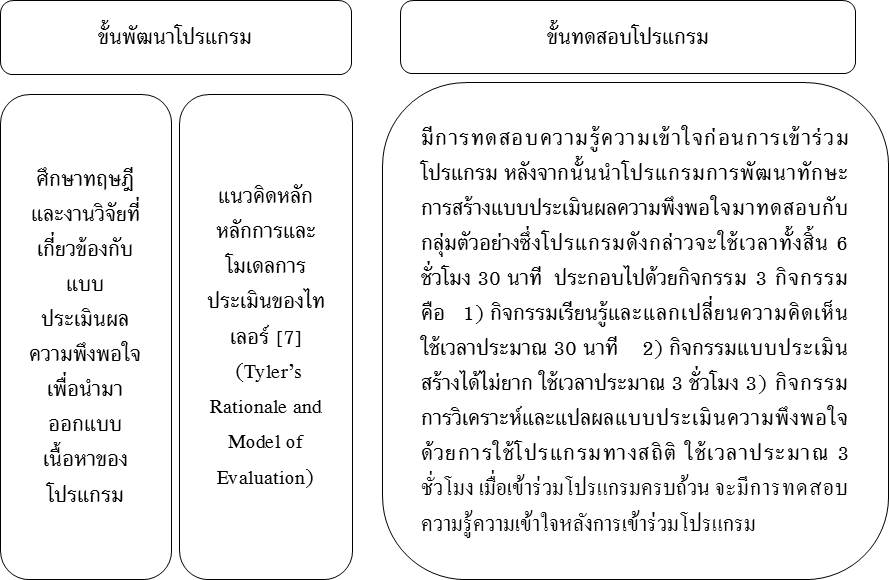การศึกษาโปรแกรมการพัฒนาทักษะการสร้างแบบประเมินผลความพึงพอใจของบุคลากรสายสนับสนุน ในสถาบันแห่งชาติเพื่อการพัฒนาเด็กและครอบครัว มหาวิทยาลัยมหิดล
Keywords:
โปรแกรม, แบบประเมินผล, ความพึงพอใจAbstract
The evaluation of satisfaction in a skill training program for a single group of non-academic personnel was performed. Researchers collected information by testing participants before and after the program. The objective of this research is to study the effectiveness of the skill training program for non-academic personnel of the National Institute for Child and Family Development at Mahidol University. For the simple sampling, we selected 15 program participants from the skills training program. An evaluation of the satisfaction of participants in the skill training program was developed from three activities comprising: 1) discussions with participants to enable them to share their experiences and express their level of satisfaction, 2) creating a simple survey form for evaluation of satisfaction and 3) analysis and interpretation of the survey results using SPSS program. This evaluation of the satisfaction in the skill training program for non-academic personnel of the National Institute for Child and Family Development was conducted for a total of 6 hours and 30 minutes. The following instruments were used to collect data: 1) evaluations of satisfaction were performed before and after the skill training program and 2) participants completed a demographic questionnaire. The data was analyzed using descriptive statistics and the Wilcoxon matched pairs signed-rank test. The resulting outcome showed that after completing the program, the mean score of an evaluation of satisfaction was significantly higher than before entering the program (p < 0.05).
References
เอกสารอ้างอิงและบรรณานุกรม
สมหวัง พิธิยานุวัฒน์ . วิธีทางการประเมินทางการศึกษา. กรุงเทพฯ : จุฬาลงกรณ์มหาวิทยาลัย; 2535
สมหวัง พิธิยานุวัฒน์. วิธีวิทยาการประเมิน : ศาสตร์แห่งคุณค่า. ครั้งที่พิมพ์ 5. กรุงเทพฯ: สำนักพิมพ์แห่งจุฬาลงกรณ์มหาวิทยาลัย; 2553
Anunt S. Measurement in Education.
Bangkok : Thaiwatanapanit, 1982.
ปรียาพร วงศ์อนุตรโรจน์. จิตวิทยาการบริหารงานบุคคล. พิมพ์ครั้งที่ 7. กรุงเทพฯ :พิมพ์ดี จำกัด; 2547
ขนิษฐา จิตอรุณ. เทคนิคการฝึกอบรมและประชุม. กรุงเทพฯ: มณฑลการพิมพ์, 2540
งานบริหารบุคคล. เอกสารส่วนงานฝ่ายทรัพยากรบุคคล. [เข้าถึงเมื่อวันที่ 25 ตุลาคม 2559].เข้าถึงได้จาก http10.31.1.120/ intranet/index.php?option=com_phocadownload&view=sections&Itemid=27
Tyler Raph W. Basic Principles of Curriculumand Instruction. Chicago: University of Chicago Press, 1964.
Kuder GF, Richardson MW. (1937). The theory of estimation of test reliability. Psychometrika 1937; 2: 151-160.
สมใจ ปราบพล. การจัดกระบวนการ
เรียนรู้ที่เน้นผู้เรียนเป็นสำคัญ. กรุงเทพฯ : สำนักงานคณะกรรมการการศึกษาแห่งชาติ สำนักนายกรัฐมนตรี; 2544
อรจรีย์ ณ ตะกั่วทุ่ง. สุดยอดพัฒนาการเรียนการสอน. กรุงเทพฯ : เอ็กซเปอร์เน็ทบุคส์; 2545
Thomas S. What is Participatory Learning and Action (PLA): An introduction. [Internet] .2015. [Cited 2017 Mar 15]. Available from: http://idp-key-resources.org/documents/0000
/d04267/000.pdf
Nicol DJ. Macfarlane-Dick D. Formative assessment and self-regulated learning: amodel and seven principles of good feedback practice. Studies in Higher Education 2006;
(2): 199-218.
แสงดาว ถิ่นหารวงษ์. การเรียนรู้แบบมีส่วนร่วม: จากทฤษฏีสู่การปฏิบัติในรายวิชาวรรณคดีสำหรับเด็ก. วารสารมนุษยสังคมปริทัศน์ 2558; 17(1): 1-11
ไพโรจน์ สถิรยากร. การพัฒนารูปแบบการฝึกอบรมเทคนิคการสอนงานปฏิบัติในหน่วยงาน. วิทยานิพนธ์ครุศาสตร์อุตสาหกรรมดุษฎีบัณฑิต สาขาวิจัยและพัฒนาหลักสูตร ภาควิชาบริหารเทคนิคศึกษา บัณฑิตวิทยาลัย สถาบันเทคโนโลยีพระจอมเกล้าพระนครเหนือ; 2547

Downloads
Published
Issue
Section
License
บทความทุกบทความที่ตีพิมพ์ในวารสารการพัฒนางานประจำสู่งานวิจัย (JPR2R) ถือว่าเป็นลิขสิทธิ์ของวารสารการพัฒนางานประจำสู่งานวิจัย คณะสิ่งแวดล้อมและทรัพยากรศาสตร์ มหาวิทยาลัยมหิดล





